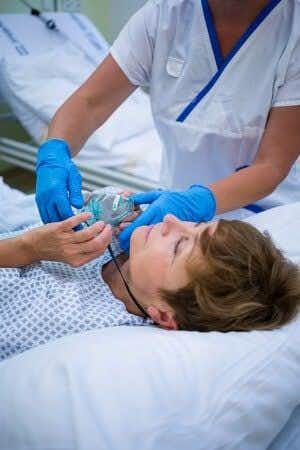This case involves a sixty-eight-year-old female who suffered from complications arising from a COPD exacerbation. The patient’s lung difficulties had been with chronic CO2 retention, as she developed toxic levels of CO2 in her blood. This patient displayed the hallmark signs of CO2 retention such as fatigue and shortness of breath. In 2008, the patient began using a BiPAP machine at night. In 2009, the patient endured a number of hospital stays due to episodes of increasing CO2 retention. After being discharged from the hospital, the patient was sent to an extended care facility. The patient remained under the care of this extended care facility for approximately 4 months, where she regularly developed further CO2 episodes and urinary tract infections. Prior to being discharged from the hospital and sent to the extended care facility, the patient was advised to use a BiPAP machine for several hours a day. The patient’s family routinely checked in with the facility to ensure that the BiPAP machine was properly utilized. The administrator at the facility advised a family member to reach out to the Bipap machine company and ask for an employee to correct the settings. It was later revealed that the settings were improper, and a subsequent investigation by the Department of Health confirmed that the machine was not properly utilized. No staff members at the facility were trained to set up this type of machine. The patient was promptly transferred to a different facility. Two months later, the patient died from a pulmonary issue.
Question(s) For Expert Witness
1. How can BiPAP treatment help a patient with COPD?
Expert Witness Response E-000024
BiPAP has been shown to provide significant benefits in selected patients with acute hypercapneic respiratory failure due to COPD, including a reduction in the need for endotracheal intubation, reduced hospital stay, and a mortality benefit. Many patients with COPD who are not hypoxemic at rest worsen during exertion. Home supplemental oxygen is commonly prescribed for these patients. Oxygen supplementation during exercise can prevent increases in pulmonary artery pressure, reduce dyspnea, and improve exercise tolerance.
About the author
Michael Talve, CEO
Michael Talve stands at the forefront of legal innovation as the CEO and Managing Director of Expert Institute. Under his leadership, the Expert Institute has established itself as a vital player in the legal technology arena, revolutionizing how lawyers connect with world-class experts and access advanced legal technology. Michael's role involves not only steering the company's strategic direction but also ensuring the delivery of unparalleled intelligence and cutting-edge solutions to legal professionals. His work at Expert Institute has been instrumental in enhancing the capabilities of attorneys in case preparation and execution, making a significant impact on the legal industry's approach to expert consultation and technological integration. Michael's vision and execution have positioned the Expert Institute as a key facilitator in the intersection of law and technology.



